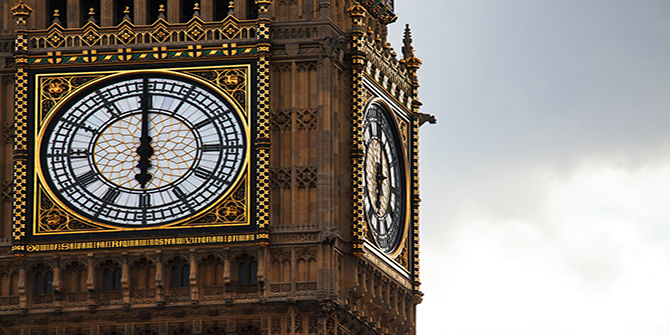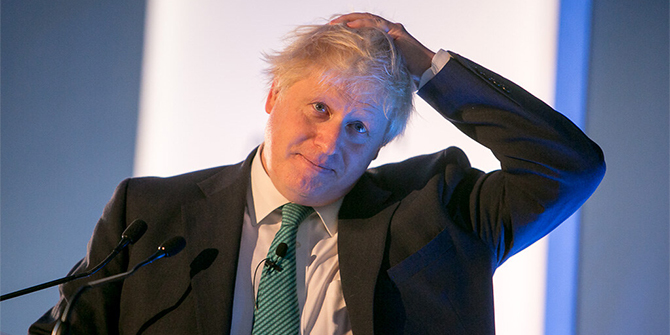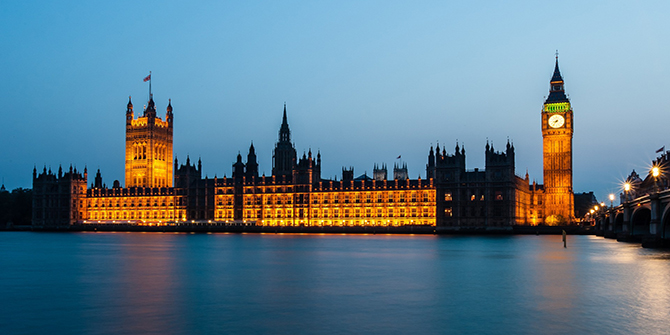 While parliamentary procedures regularly favour the Conservative and Labour parties, small parties can (and often do) make themselves heard, writes Louise Thompson. Drawing on best practice from all of the smaller parties in the Commons, she outlines three key areas for the Liberal Democrats to focus on in order to increase their impact.
While parliamentary procedures regularly favour the Conservative and Labour parties, small parties can (and often do) make themselves heard, writes Louise Thompson. Drawing on best practice from all of the smaller parties in the Commons, she outlines three key areas for the Liberal Democrats to focus on in order to increase their impact.
Upon his election as Leader of the Liberal Democrats at the end of August, Ed Davey spoke of his plans to set his party on the path to political recovery. Calling on party members to ‘wake up and smell the coffee’, he outlined his ambition to travel up and down the country, reconnecting with voters. New Deputy Leader Daisy Cooper later echoed these comments, saying ‘it is more important than ever that Liberal Democrats listen and win in every part of the UK’. It’s understandable that the focus for the party leadership is on making electoral gains; the nature of the first-past-the-post electoral system meant that their 3.6 million votes returned only 11 MPs to the House of Commons in December 2019 (a huge contrast to the SNP who received far fewer votes but returned over four times as many MPs).
The Lib Dems have a good track record at winning by-elections – their victory in Brecon and Radnorshire last summer saw the government’s Commons majority fall to just one – so there is a chance that they may pick up an additional MP or two over the course of this Parliament. But with the next General Election still several years away, how can Ed Davey ensure that the party punches above its weight on the green benches of the Commons?
My research on small parties has found that there are two main issues facing small parties in all parliaments: a lack of resources and a lack of visibility. Resource problems can be seen in parties’ finances – poor electoral performance manifests itself in fewer donations from big business or wealthy individuals (see the latest donation figures reported to the Electoral Commission and how donations to the smaller parties are dwarfed by those to Labour and the Conservatives). It also brings a smaller ‘short money’ grant (the public funding given to opposition parties to enable them to scrutinise the government properly in parliament). Poor visibility can be the result of chamber design (with no designated despatch box from which to speak), procedural rules which privilege the larger parties in terms of guaranteed, full-length speeches and outside observers, particularly the media, who have little appetite to hear arguments made in parliament beyond those by the largest two or three parties. The party says on its own website that you probably won’t hear about the work of its MPs on the ten o’clock news.
Davey’s parliamentary leadership so far demonstrates this well. He waited nearly three weeks to make his Commons debut as leader, making a short, three-minute speech during the Second Reading of the controversial Internal Market Bill, waiting for over three hours in the Commons in order to do so. The same week he was called at Prime Minister’s Questions, pressing Boris Johnson for reassurances around care for disabled people during coronavirus restrictions, but he had not been called at all on the previous two Wednesdays.
Drawing on best practice from all of the smaller parties in the Commons, there are three areas for Davey’s Liberal Democrats to focus on to increase their parliamentary impact:
Streamlined and focused policy portfolios
It is common practice for small parties to double-up portfolios to ensure that one MP is responsible for every possible aspect of government policy. For some, it is about trying to look and act like the ‘big two’ parties – putting a spokesperson on the green benches for every question time, debate, and ministerial statement. As Guardian sketchwriter John Crace writes, ‘everyone is included’ in a Lib Dem shadow cabinet. The smaller the party, the more portfolios each MP has to juggle. Christine Jardine for example, holds the position of Liberal Democrat spokesperson for three large policy areas – International Trade, Exiting the European Union, and Treasury. For Jardine, there is overlap, but others (like Wendy Chamberlain) are not so lucky. Keeping on top of all of these portfolios can be tricky, taking up large amounts of parliamentary staff time and it encourages parties and their members to spread themselves thinly in the Commons as they try to maintain visibility in every question, statement or debate relevant to their portfolio. Small party spokespeople may rush to the Commons for a statement but are reliant upon the Speaker who may not actually call them to speak. It can also prevent them from other parliamentary work such as select committees and constituency work.
The Liberal Democrats have already taken steps towards streamlining their parliamentary activity elsewhere, such as choosing not to participate in public bill committees in the last Parliament. Condensing portfolio work into key themes rather than attempting to mirror each and every government department would ease MP workload and help to concentrate their parliamentary priorities further.
Maximise parliamentary airtime
As the official third party in the Commons until the 2015 General Election, the Lib Dems became used to regular, guaranteed speaking slots in the chamber. Losing third party status brought greater unpredictability and means most Lib Dem contributions will fall towards the end of debates, but strategic use of speaking time can help to push the party’s message across sooner. Interventions in debates are particularly important here. A Lib Dem MP who intervenes during the minister’s or shadow minister’s speech at the very start of a debate can highlight a key party concern while the chamber is still packed with MPs and journalists are still watching. See Jim Shannon’s intervention on the Prime Minister during the second reading of the Internal Market Bill to stress his support for the legislation. This can also be used when a small party MP is making a speech of their own: allowing their party colleagues to intervene helps to extend the amount of time that party is holding the floor, as the SNP so adeptly did during the House’s consideration of Brexit legislation in the last Parliament. It was difficult for MPs to make interventions during the hybrid sittings of the Commons earlier this year and this may have made smaller party voices go unheard, but it undoubtedly aids parliamentary visibility and helps emphasise parties’ key messages.
Using a range of parliamentary and external mechanisms can build these messages further. Wera Hobhouse’s successful campaign to introduce an ‘upskirting’ law demonstrates the impact that the party can make if it combines parliamentary procedures (in this case a private member’s bill), with cross-party work and a strong social media campaign. When the government introduced the Voyeurism (Offences) (No.2) Bill in July 2018, it was Hobhouse who was commended. Campaigns such as this demonstrate how successful smaller parties can be in making their voices heard and, ultimately, in changing the law.
Differentiate yourself from the larger parties
The lack of guaranteed speaking slots means that smaller party MPs can struggle to stand out from larger parliamentary parties. A small party MP preparing to attend question time does not have the luxury of preparing just one or two questions to pose to a minister. Rather, they must arrive armed with several, to ensure that they are not repeating questions that have already been asked by the parties whose spokesmen will inevitably have been called to speak before them. This brings further resource issues as MPs and staff work hard to prepare enough options, but it can also bring opportunities to raise very different issues from the bigger parties and thus stand out. Finding a strong issue which resonates well with both MPs and the wider public (as the upskirting campaign did so clearly) and raising these issues when called to speak in debates, statements or question times, helps make what may be more limited contributions to be more memorable and impactful.
Parliamentary procedures can seem to favour the Government and the Official Opposition, but small parties can – and do- make themselves heard. The challenge for Davey is to use the Commons to make the Lib Dem voice sound even louder. As he said in his victory speech last month, ‘the hard work starts today’.
____________________
 Louise Thompson (@louisevthompson) is Senior Lecturer in Politics at the University of Manchester. She researches small political parties in the UK’s parliaments (ESRC ES/R005915/2). Her book, The End of the Small Party? Change UK and the challenges of parliamentary politics, was published by MUP in 2020.
Louise Thompson (@louisevthompson) is Senior Lecturer in Politics at the University of Manchester. She researches small political parties in the UK’s parliaments (ESRC ES/R005915/2). Her book, The End of the Small Party? Change UK and the challenges of parliamentary politics, was published by MUP in 2020.







